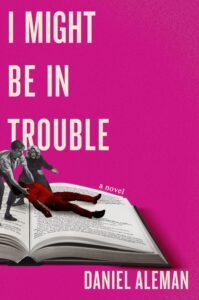Authors are some of the most dangerous people to date. Not because we’re any more likely to break your heart, and not even because many of us happen to know gory, murderous details that might make even the most hardened criminals queasy (all for the sake of book research, of course). No, the real reason authors are dangerous is that, if you hurt us, we will write about you. Sometimes, we will go as far as to turn you into a character in one of our books—and kill you.
I constantly find myself asking just how honest I’m allowed to be in my books, whether it’s ethical to write characters inspired by people I know, and where to draw the line between fact and fiction. But what are authors meant to do, if not take what wounds us and reshape it on the page? Where can we find inspiration, if not in our own lived experiences? How are we meant to understand ourselves and the world around us if we can’t write truthfully?
For me, telling stories inspired by my own life is not a choice as much as a necessity: writing is how I process everything that happens to me, good or bad. So, naturally, when I had a romantic experience go sour a few years ago, my first instinct was to turn to pen and paper.
You see, the person I was with turned out not to be who he’d said he was. As in, at all. We first met on a dating app, and there was an instant connection. He was a few years older than me. He lived abroad and traveled often for work, which was how he found himself in my city. After our first whirlwind encounter, I thought we might never talk to each other again, but even after he returned home, he made a point to stay in touch through texts, Snapchat, Instagram—you name it, and he was there, messaging me at all hours.
What followed was a seven-month situationship during which we talked constantly and traveled to meet each other halfway. I was starting to think this could become something more serious by the time the pandemic hit in March of 2020, which was when everything changed. Our upcoming travel plans were canceled. Communication with this handsome fella became more distant, and I started to feel unsettled by the sudden change in our dynamic. I had a feeling there was something wrong—something that perhaps I had failed to notice before—so I did a deep search into him online. Of course, I had googled this guy before (as I strongly recommend doing if you’re dating someone new!) but I hadn’t found anything of note. Only his LinkedIn profile, social media accounts, and some old articles from when he did sports back in college. Upon diving into more hidden parts of the internet, however, I stumbled upon a wedding registry at Pottery Barn—one with his name on it.
Yes, this man was in fact engaged. He was planning a wedding and had spent months lying to me about his relationship status, his plans for the future, and even his real age. It took me a while to get over the shock. I couldn’t wrap my head around why he had done any of this. More than that, I couldn’t understand how I had been so naïve. I’d never thought of myself as someone who could be fooled easily. I was no stranger to online dating, so it wasn’t like I hadn’t taken the normal precautions of 1) making sure the other person is real, 2) doing a basic bit of research on them, and 3) ensuring they’re not some sort of psychopath. I just never anticipated someone could lie to my face like that, never imagined any of this could happen in real life.
Once the dust settled a bit, my mind automatically turned to writing. I needed to do what I always do: process this experience by talking about it in one of my books, and so I created a protagonist who shares more than a few commonalities with me.
My adult debut, I Might Be in Trouble, follows David Alvarez, an author in his mid-twenties who meets a handsome stranger on a dating app—a stranger who, after a whirlwind evening of barhopping, winds up dead in bed next to the main character. Completely terrified that he may have actually killed his date, David chooses to call the one person he trusts in a moment of crisis: his literary agent, Stacey, who has some… ideas about how to deal with the dead body. And this would all be fine, if it wasn’t because of the secret identity the dead guy was hiding—an identity shaped by the lies told by someone I once knew, and which might just complicate everything for David and Stacey.
Now, while I have never found a dead body in my bed, working on this book was a cathartic experience. Writing about these characters helped me move on from this whole situation—and I genuinely feel an odd sense of poetic justice after killing a character inspired by someone who once hurt me.
I strongly believe that, as authors, we own our own experiences, and we have a right to shape them into books. I also believe that we have a responsibility to protect the identity of the real individuals who inspire our stories, whether we feel fondly about them… or not. As for where exactly to draw the line between fact and fiction? Well, I don’t know the answer to that, but what I do know is this: authors have more power than you might think, so be cautious before dating one of us. And, if you absolutely must date an author, then think twice before betraying us, because we can and most definitely will kill you (in fiction, of course).
***


















